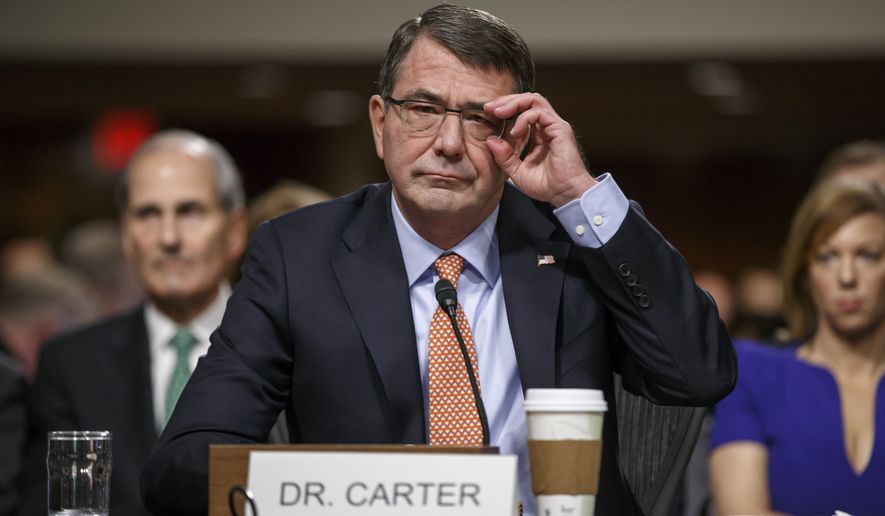As Congress begins debate on authorizing a war, senators voted Thursday to install Ashton Carter as secretary of defense, making him the top civilian official overseeing the fight against the Islamic State while trying to grapple with Iran, Russia and other hot spots amid tight Pentagon budgets.
Republicans said they hoped Mr. Carter, who has served as the No. 2 civilian at the Pentagon, would be an independent voice willing to push President Obama beyond his reticent approach — and the early going suggests they are right.
During his confirmation hearing last week, Mr. Carter said he would consider revising the U.S. military commitment in Afghanistan, and he broke with the White House in saying he believed the U.S. should supply lethal arms to Ukraine, which is battling Russian-backed separatists.
Mr. Carter was confirmed easily on a 93-5 vote, marking the first Cabinet position to be filled by the Republican-led Senate.
“America needs a strong secretary of defense now more than ever,” said Sen. John McCain, Arizona Republican and chairman of the Armed Services Committee. “I think Dr. Carter will be a good secretary of defense.”
Still, Mr. McCain predicted that Mr. Obama would hamstring Mr. Carter and keep most key decisions at the White House.
After Mr. Carter spoke out about sending arms to Ukraine, the White House pointedly said the commander in chief sets those kinds of policies.
Mr. McCain said some of Mr. Carter’s predecessors have chafed at what they saw as micromanagement from the White House, and he hoped Mr. Obama would give power to his new Pentagon chief.
Weighty issues await Mr. Carter, including making the case for a resolution authorizing the use of military force to go after the Islamic State, which holds territory in Syria and Iraq. Mr. Obama sent vague but expansive draft language to Congress this week asking for a three-year authorization, but his request is meeting stiff resistance from both sides of the congressional aisle.
Mr. Carter also will have to try to follow through on Mr. Obama’s pledge to close the detention facility for terrorist suspects at Guantanamo Bay, Cuba, though he told senators last week that he won’t succumb to pressure from Mr. Obama to approve transfers of dangerous prisoners.
He said he doubts the prison can be closed during the president’s final two years in office.
Also awaiting Mr. Carter is a tricky budget situation. The Defense Department is grappling with the 2012 across-the-board “sequester” cuts approved by Congress after Republican lawmakers and Mr. Obama failed to reach a broader deal on ways to reduce the deficit.
The president said in a statement Thursday that Mr. Carter will be responsible for suggesting ways to reverse those cuts.
“As secretary of defense, Ash will play a central role in our work with Congress to find a more responsible approach to defense spending that makes the department more efficient, preserves military readiness and keeps faith with our men and women in uniform and their families,” Mr. Obama said.
Mr. Carter has a doctorate in theoretical physics from Oxford University, where he was a Rhodes scholar, and served first as the Pentagon’s chief of acquisitions and technology and later as deputy secretary during the Obama administration.
He wrote an op-ed in 2006 arguing for a preemptive strike against North Korea to keep it from acquiring nuclear weapons. In 2011, he urged Mr. Obama to keep troops in Iraq, arguing that it would be difficult to reintroduce military forces later if needed.
Now, Mr. Carter will oversee a troop surge to Iraq to fight the Islamic State, though Mr. Obama has said he doesn’t want a significant use of combat troops in the renewed war.
Republicans and Democrats alike said they trusted Mr. Carter to move forward.
“He is an experienced, effective leader,” said Sen. Jack Reed, the ranking Democrat on the Armed Services Committee, praising the “bipartisan vote of confidence” Mr. Carter was given.
All five opposition votes were cast by Republicans. Sen. Roy Blunt of Missouri said Mr. Carter showed little ability to change Mr. Obama’s “flawed agenda.”
Mr. Carter will replace Secretary Chuck Hagel, a former Republican senator who took the post in 2013 after surviving a filibuster by his former GOP colleagues who were concerned by his rocky confirmation hearing.
Mr. Carter had no such problems. He earned high marks from both sides of the aisle and breezed through the Senate a week after the Armed Services Committee held a hearing on his nomination.
By contrast U.S. Attorney Loretta Lynch, Mr. Obama’s pick to be attorney general, had her confirmation hearing in January and is still awaiting action in the Senate Judiciary Committee. This week, she submitted 221 pages of written answers to questions from senators and faces another round of written follow-ups before a committee vote in two weeks.
Some Democrats pointedly wonder whether Ms. Lynch has been placed on a slower schedule was because she is a woman. Sen. Patrick J. Leahy of Vermont, the ranking Democrat on the Judiciary Committee, said he expects the full Senate to confirm her eventually, which makes the delay “needless.”
Along with Mr. Blunt, Republicans who voted against Mr. Carter’s confirmation were Mike Crapo and Jim Risch of Idaho, Mark Kirk of Illinois and John Boozman of Arkansas.
• Stephen Dinan can be reached at sdinan@washingtontimes.com.




Please read our comment policy before commenting.